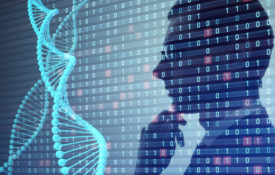-

On Educational Attainment, It’s Nature and Nurture, Study Suggests
The reason people achieve a certain level of education may depend partly on genetic influences mediated by the home environment.
-
Why Coronavirus Conspiracy Theories Flourish. And Why It Matters.
The coronavirus has given rise to a flood of conspiracy theories, disinformation and propaganda, eroding public trust and undermining health officials in ways that could elongate and even outlast the pandemic. Claims that the virus is a foreign bioweapon, a partisan invention or part of a plot to re-engineer the population have replaced a mindless virus with more familiar, comprehensible villains. Each claim seems to give a senseless tragedy some degree of meaning, however dark. ... “It has all the ingredients for leading people to conspiracy theories,” said Karen M. Douglas, a social psychologist who studies belief in conspiracies at the University of Kent in Britain. ...
-
The Coronavirus Outbreak Keeps Humans from Touching. Here’s Why That’s So Stressful
With people around the world practicing social distancing and self-isolation to curb the further spread of coronavirus, some are starting to feel the effects of a lack of human touch. Whether it’s shaking a coworker’s hand or hugging a friend, most people are accustomed to some level of platonic physical touch on a daily basis. But for those who are quarantining alone or with people with whom they don’t have physical contact, loneliness and social isolation are growing health concerns. ... According to Dacher Keltner, a professor of psychology at the University of California, Berkeley, a lack of physical touch can affect people in more ways than they might realize.
-
The Science of Helping Out
At a time when we are all experiencing an extraordinary level of stress, science offers a simple and effective way to bolster our own emotional health. To help yourself, start by helping others. Much of the scientific research on resilience — which is our ability to bounce back from adversity — has shown that having a sense of purpose, and giving support to others, has a significant impact on our well-being.
-
The Three Equations for a Happy Life, Even During a Pandemic
It seems strange to launch a column on happiness during a pandemic. The timing is, well, awkward, isn’t it? Maybe not. We’re stuck at home; our lives on COVID time have slowed to a near halt. This creates all sorts of obvious inconveniences, of course. But in the involuntary quiet, many of us also sense an opportunity to think a little more deeply about life. In our go-go-go world, we rarely get the chance to stop and consider the big drivers of our happiness and our sense of purpose. ... The scientific study of happiness has exploded over the past three decades. The Nobel Prize winners Daniel Kahneman and Angus Deaton (both at Princeton University) publish extensively on the subject.
-

Maintaining Lockdown and Preparing an Exit Strategy: A View from Social and Behavioral Sciences
Belgian social psychologists presented this memo to the federally appointed committee that is preparing “the gradual exit strategy” from the COVID-19-related lockdown in Belgium.

